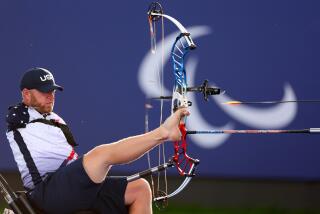It’s Still the Sporting Life for Him
- Share via
At 18, Brad Parks was lying in a hospital bed with two paralyzed legs, the result of a skiing accident, wondering what he could do with the rest of his life.
“I began to think of things I could do. I knew I had a life to lead and had to make the best of the situation,” said Parks, now 33. “I just couldn’t sit around and be upset.”
Now, others in similar circumstances are asking him the same questions he asked himself, and he shares his answers with them.
“I know I’m a role model for a lot of people,” said Parks, who is the founder and president of the San Clemente-based National Foundation of Wheelchair Tennis and who participates in many other sports. “A lot of people helped me out, and I think it’s a duty to help others out.”
Parks said he really didn’t learn to deal with the environment and himself until he left the hospital.
“When you get out to the real world, you learn from other people who are successful while they are in a wheelchair.”
Parks, who graduated from Dana Hills High, was a freshman at the University of Utah at the time of the accident.
He has since become a champion wheelchair tennis player, a golfer and wheelchair marathoner, and continues to scuba dive.
He would like to return to snow skiing, but this time in a sit-down ski set-up. He would also like to water ski with the aid of a similar device.
Although Parks likes all sports, he favors tennis. He was the No. 1-ranked wheelchair player in the world from 1980 through 1989, and he is now No. 2.
Still, Parks, who is married and the father of twin daughters, says, “The No. 1 thing in my life is my family.”
Parks said he learned to use a wheelchair to play sports to stay active.
“All my friends were on their feet, but I could go out and do things like I used to do,” he said. “And I could go out with my parents.”
Wheelchair tennis in particular, he said, “helped make my life better. I started to realize the tremendous benefits, both mentally and physically, you can get from the game.”
More recently, he has become fascinated with golf.
He balances himself with a hand-gripped crutch in his left hand and strikes the ball with the club in his right.
He plays regulation courses in the 80s.
“I never thought I would be able to hit a golf ball 200 yards,” he said. “You never know what can happen if you try.”
Parks is also promoting wheelchair sports camps for youngsters.
“We created the camp concept because there weren’t any good organized sports programs for kids in wheelchairs,” he said. The camp instructors are in wheelchairs “so kids can see that being in a chair doesn’t mean the end of the active athletic part of life.”
Acknowledgments--Nathan Forrest of Tustin and Nancy Bradshaw of Fullerton were two of the 15 national winners of the 1990 Hemophilia Essay Contest and were flown to the recent meeting of the XIX International Congress of the World Federation of Hemophilia in Washington. The contest, sponsored by Baxter Healthcare Corp., was designed to increase awareness of hemophilia-related therapies and research.
More to Read
Sign up for Essential California
The most important California stories and recommendations in your inbox every morning.
You may occasionally receive promotional content from the Los Angeles Times.













